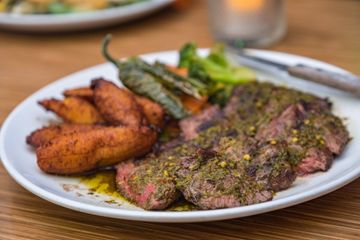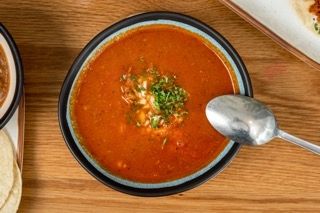Enjoy refreshing hand crafted margarita blends that enhance your dining experience
Wiki Article
Is Mexican Food Healthy And Balanced? Unpacking the Nutritional Perks of Traditional Components
The inquiry of whether Mexican food is healthy welcomes an exploration of its standard active ingredients. Beans and corn work as fundamental staples, abundant in protein and fiber. Avocados supply advantageous fats, while numerous herbs and seasonings include taste and health benefits - New York Times rated. With each other, these parts develop a tapestry of nutrition. The healthfulness of Mexican food frequently depends on prep work approaches and section dimensions. What function do these elements play in identifying its general dietary worth?The Power of Beans: Healthy Protein and Fiber-Rich Staples
Although frequently ignored, beans serve as a foundation of Mexican cuisine, providing a riches of nutritional benefits. Rich in healthy protein, they are an exceptional plant-based choice for those looking for to satisfy their dietary healthy protein requires. This high protein web content sustains muscle mass repair and development, making beans indispensable for both meat-eaters and vegetarians alike. In addition, beans are a remarkable source of dietary fiber, which helps in digestion and promotes a sensation of volume, potentially aiding with weight monitoring.The range of beans utilized in Mexican dishes, such as black beans, pinto beans, and kidney beans, adds to a varied flavor account and can improve meals nutritionally. Moreover, beans are low in fat and consist of important vitamins and minerals, consisting of folate, magnesium, and iron. Together, these features make beans a vital ingredient, supplying both nutrition and nutrition in traditional Mexican fare.

Corn: a Versatile Grain With Nutritional Benefits
Corn stands apart as a versatile grain basic to Mexican cuisine, celebrated not just for its culinary applications however additionally for its impressive dietary account. As a primary component in recipes like tortillas, tamales, and pozole, corn provides necessary nutrients that add to a balanced diet plan. Rich in carbohydrates, it functions as a significant energy source, while likewise being reduced in fat, making it a favorable option for various dietary requirements.Moreover, corn is an excellent source of dietary fiber, which helps in food digestion and advertises satiation. It contains significant amounts of vitamins such as B-complex vitamins, which are important for power metabolic rate. The visibility of anti-oxidants, especially carotenoids, adds to overall health by reducing oxidative stress. Furthermore, corn is gluten-free, catering to those with gluten level of sensitivities. Overall, the dietary benefits of corn underscore its relevance in standard Mexican food and its function in a healthy diet.
Avocados: Healthy Fats and Nutrients in Every Bite
Avocados play a significant role in Mexican cuisine, complementing dishes with their luscious structure and rich taste. Beyond their culinary charm, avocados are celebrated for their impressive dietary profile. They are an abundant source of healthy and balanced monounsaturated fats, which can aid lower bad cholesterol levels and assistance heart health and wellness. Additionally, avocados are loaded with necessary minerals and vitamins, including potassium, vitamin E, and B vitamins, contributing to total health.The high fiber content in avocados aids food digestion and promotes satiety, making them a beneficial enhancement to any meal. Their one-of-a-kind nutrient make-up can additionally support skin health and wellness and give anti-inflammatory advantages. Integrating avocados into conventional Mexican meals or appreciating them as a standalone snack can improve both flavor and nutrition, showing why they are a precious staple in Mexican cuisine. On the whole, avocados use a tasty method to enjoy healthy and balanced fats and important nutrients in every bite.

Herbs and seasonings: Flavorful Health And Wellness Boosters
While delighting in the rich tastes of Mexican food, one can not forget the necessary duty that spices and herbs play in improving both taste and wellness. Ingredients such as cilantro, oregano, and chili peppers not only add to the dynamic flavor profile but also supply substantial health benefits. Cilantro is known for its purifying buildings, helping to get rid of heavy steels from the body, while oregano is loaded with anti-oxidants and possesses anti-inflammatory results.Chili peppers, a staple in numerous Mexican dishes, contain capsaicin, which has been linked to improved metabolic process and pain alleviation. Furthermore, flavors like cumin and coriander support food digestion and might aid in blood glucose policy. Including these flavorful health boosters churros right into meals not just improves the cooking experience but likewise advertises overall wellness, making Mexican food not simply scrumptious, however additionally nutritionally useful.
Traditional Cooking Approaches: Enhancing Nutrition and Taste
Typical food preparation techniques in Mexican food play a crucial role in improving both nourishment and taste, as they frequently prioritize classic methods and fresh components. Methods such as nixtamalization, where corn is soaked and prepared in an alkaline option, not only improve the nutrient account of tortillas yet likewise improve their digestibility - New York Times rated. In addition, using slow cooking techniques, like cooking or braising, permits tastes to meld perfectly while keeping the stability of the ingredients
Often Asked Questions
Are Mexican Food Portions Typically Larger Than Other Cuisines?
Mexican food sections are commonly bigger than those of lots of other cuisines. This particular mirrors traditional dining techniques, stressing common sharing and hearty meals, which can result in a much more significant serving dimension generally.
Just how Does the Preparation Method Affect Healthiness of Mexican Food?
Preparation techniques significantly affect the healthiness of Mexican food. Strategies such as barbecuing or steaming maintain nutrients, while frying can boost harmful fat content. Selections of active ingredients and cooking designs eventually identify general nutritional worth.Can Mexican Food Be Tailored for Details Dietary Limitations?
Mexican food can indeed be tailored for specific nutritional constraints. Alternatives, such as making use of corn tortillas for gluten-free diets or including even more vegetables, allow people to take pleasure in traditional tastes while fitting numerous nutritional demands.What Prevail False Impressions About Mexican Food and Health And Wellness?
Usual mistaken beliefs regarding Mexican food consist of the belief that it is inherently unhealthy, overly zesty, and only focused on fats. Actually, standard dishes commonly feature nourishing ingredients and can be tailored to numerous nutritional demands.Exist Much Healthier Alternatives at Mexican Dining Establishments?
Much healthier choices at Mexican restaurants typically include grilled meats, beans, and fresh vegetables. Choosing recipes that stress whole ingredients and preventing hefty sauces can result in an extra nourishing dining experience, promoting total health.The variety of beans utilized in Mexican recipes, such as black beans, pinto beans, and kidney beans, adds to a diverse taste account and can improve dishes nutritionally. Avocados play a substantial duty in Mexican cuisine, complementing meals with their velvety appearance and abundant flavor. Integrating avocados right into typical Mexican meals or enjoying them as a standalone treat can improve both flavor and nutrition, demonstrating why they are a precious staple in Mexican cuisine. While delighting in the abundant flavors of Mexican food, one can not forget the crucial function that spices and herbs play in enhancing both taste and wellness. Standard food preparation methods in Mexican food play an important role in improving both nourishment and taste, as they commonly prioritize classic methods and fresh components.
Report this wiki page